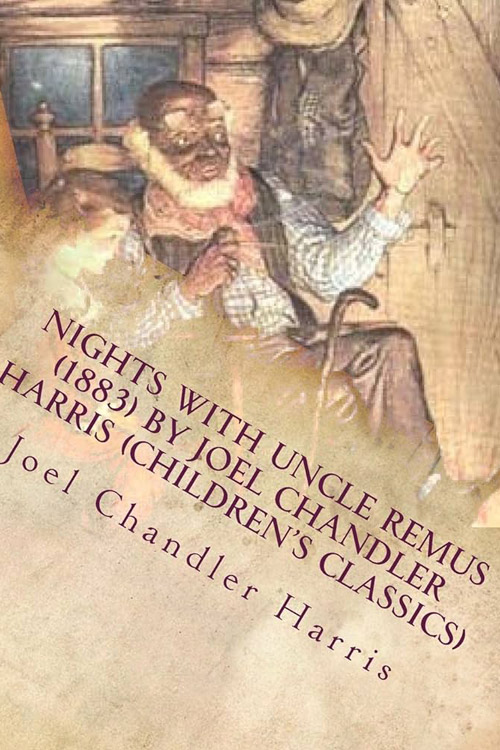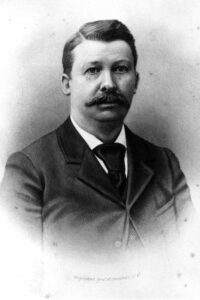
Nights With Uncle Remus
Uncle Remus chuckled a moment over the escape of Brother Rabbit and then turned his gaze upward toward the cobwebbed gloom that seemed to lie just beyond the rafters. He sat thus silent and serious a little while but finally squared himself around in his chair and looked the little boy full in the face. The old man’s countenance expressed a curious mixture of sorrow and bewilderment.
Catching the child by the coat sleeve, Uncle Remus pulled him gently to attract his attention. “Hit look like ter me,” he said presently, in the tone of one approaching an unpleasant subject, “dat no longer stiddy I see one er dem ar Favers chillun climbing dat ar big red-oak out yan’, en den it seem like dat a little chap ’bout yo’ size, he tuck’n start-up ter see ef he can’t play smarty like de Favers’s yearlins. I dunner w’at in de name er goodness you wanter be a-copyin’ atter dem ar Faverses fer. Ef you er gwine ter copy atter yuther folks, copy atter dem w’at’s some ‘count. Yo’ pa, he got de idea dat some folks is good ez yuther folks; but Miss Sally, she knows better. She know dat dey ain’t no Favers ‘pon de top side er de yeth w’at kin hol’ der han’ wid de Abercrombies in p’int er breedin’ en raisin’. Dat w’at Miss Sally know. I bin keepin’ track er dem Faverses sence way back yan’ long ‘fo’ Miss Sally wuz born’d.
Ole Cajy Favers, he went ter de po’house, en ez ter dat Jim Favers, I boun’ you he know de inside er all de jails in dish yer State er Jawjy. Dey allers did hate niggers kase dey ain’t had none, en dey hates um down ter dis day. “Year ‘fo’ las’,” Uncle Remus continued, “I year yo Unk’ Jeems Abercrombie tell dat same Jim Favers dat ef he lay de weight er he han’ on one er his niggers, he’d slap a load er buck shot in ‘im; en, bless yo’ soul, honey, yo’ Unk’ Jeems wuz des de man ter do it. But dey er monst’us perlite unter me, dem Faverses is,” pursued the old man, allowing his indignation, which had risen to a white heat, to cool off, “en dey better is,” he added spitefully, “kase I know der pedigree fum de fus’ ter de las’, en w’en I gits my Affikin up, dey ain’t nobody, ‘less it’s Miss Sally ‘erse’f, w’at kin keep me down.
Read or download Book
Joel Chandler Harris
Joel Chandler Harris (December 9, 1848 – July 3, 1908) was an American journalist and folklorist best known for his collection of Uncle Remus stories.
Biography.
Born in Eatonton, Georgia, where he served as an apprentice on a plantation during his teenage years, Harris spent most of his adult life in Atlanta as an associate editor at The Atlanta Constitution. Harris led two professional lives: as the editor and journalist known as Joe Harris, he supported a vision of the New South with the editor Henry W. Grady (1880–1889), which stressed regional and racial reconciliation after the Reconstruction era; as Joel Chandler Harris, fiction writer, and folklorist, he wrote many ‘Brer Rabbit’ stories from the African-American oral tradition.
Joel Chandler Harris was born in Eatonton, Georgia, in 1848 to Mary Ann Harris, an Irish immigrant. His father, whose identity remains unknown, abandoned Mary Ann shortly after Harris’ birth. The parents had never married; the boy was named Joel after his mother’s attending physician, Dr. Joel Branham. Chandler was the name of his mother’s uncle. Harris remained self-conscious of his illegitimate birth throughout his life. A prominent physician, Dr Andrew Reid, gave the Harris family a small cottage behind his mansion. Mary Harris worked as a seamstress and helped neighbours with gardening to support herself and her son. She was an avid reader and instilled a love of language in her son: “My desire to write—to express my thoughts—grew out of hearing my mother read The Vicar of Wakefield.” Dr. Reid also paid for Harris’ school tuition for several years.
In 1856, Joe Harris briefly attended Kate Davidson’s School for Boys and Girls but transferred to Eatonton School for Boys later that year. He had an undistinguished academic record and a habit of truancy. Harris excelled in reading and writing but was mostly known for his pranks, mischief, and sense of humour. Practical jokes helped Harris cloak his shyness and insecurities about his red hair, Irish ancestry, and illegitimacy, leading to both trouble and a reputation as a leader among the older boys.






